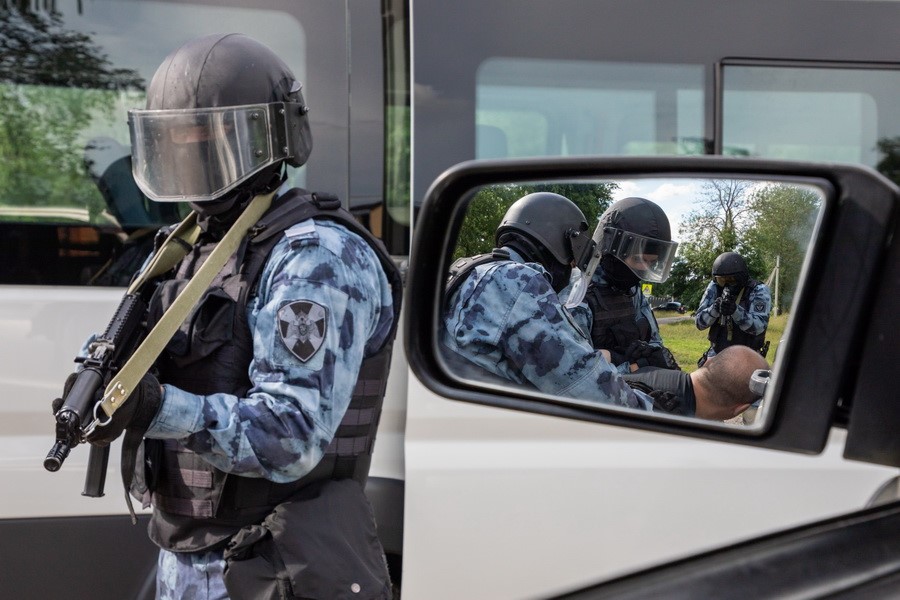
Russia Monitor is a review of the most important events related to Russian internal and external security, as well as its foreign policies.
Date: 26 July 2020
July Brings Sweeping Crackdown in Russia
Shortly after Russians cast their ballots in a much-discussed constitutional plebiscite to consolidate Putin’s life-long grip on power, the Russian regime kicked off a clampdown on dissent and curbed any signs of independence amongst the ruling elite, notably in Russian regions. The Kremlin has no intention of quitting its harsh course or just waits patiently if –– like in Khabarovsk Krai –– there emerges the imminent risk of violence.

As Russian euphoria over the annexation of Crimea faded over time, Putin saw his popularity ratings dwindle year by year. A turning point was the 2018 controversial pension reform that hit hard Putin’s traditional supporters. The Russian president could not shirk responsibility for the extremely unpopular social reform. Thus his ratings rapidly went down. This is why Putin ordered a tightly managed vote on constitutional changes that would pave his way to extend his stronger-than-ever rule before social support collapses. The Russian leader’s plan began in January this year yet got stuck in limbo with the staggering coronavirus pandemic that shed the spotlight on a series of shortcomings in Putin’s policy whilst discarding his image of a strong leader, especially amongst his most avid supporters.
So the Kremlin began to rush and sealed Putin’s grip on power as soon as in early July. State officials kick-started a purge in a showcase that Putin can control everything, also seeking to halt or at least impede any negative trends for his rule over the country. On July 6, journalist Svetlana Prokopyeva was convicted in Pskov of “justifying terrorism” and was ordered to pay a fine over an article she wrote in 2018 in which she discussed a bombing outside the Federal Security Service (FSB) offices in Arkhangelsk. Just a day after, Ivan Safronov, a former journalist and an adviser to the head of Russia’s space agency Roscosmos, was detained by the Federal Security Service on suspicion of treason. On July 8, authorities stormed the apartment of opposition activist Pyotr Verzilov, and on July 9, the homes of at least five other opposition activists were raided in Moscow. One thing connected them: earlier all had campaigned against Putin’s constitutional amendments.
On July 22, a Russian court sentenced Yuri Dmitriyev, a history researcher and the head of the Memorial Association in Karelia in northern Russia, to 3.5 years in prison. But Russia’s elites got a severe blow, too. Safronov’s detainment undermined the position of Dmitry Rogozin, the head of Russia’s space agency. Rogozin has been under fire for the agency’s poor performance. But what grabbed most attention are recent events in Russia’s Far East. Vladimir Putin dismissed Sergei Furgal, the former governor of Russia’s Khabarovsk region, as the latter had been arrested on July 9. His imprisonment was not accidental, though. The unexpected emergence of allegations stemming from so long ago has people wondering why the regime found it was perfect time to use them against the governor. Why? The Kremlin sent a warning signal to all governors to keep their emotions in check. Many regions are now on the brink of economic collapse as Moscow burdened them with the fight with the Covid-19 pandemic yet refused to offer aid. Thus both people and regional officials began to express growing dissatisfaction. The Kremlin will stand to defend its course, as exemplified by the arrest of Furgal, replaced with a Kremlin-loyal person in a somewhat ostentatious move, and its showy disrespect for days-long rallies in Khabarovsk.
Support Us
If content prepared by Warsaw Institute team is useful for you, please support our actions. Donations from private persons are necessary for the continuation of our mission.
All texts published by the Warsaw Institute Foundation may be disseminated on the condition that their origin is credited. Images may not be used without permission.














